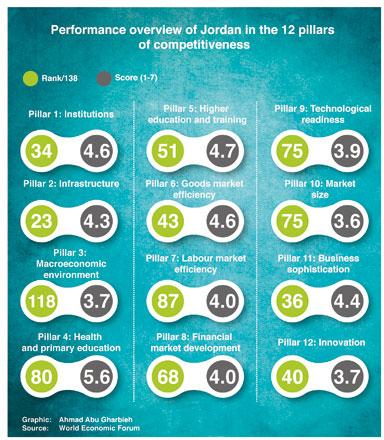You are here
Jordan improves ranking as competitive economy
By JT - Sep 03,2014 - Last updated at Sep 03,2014
AMMAN – Jordan's ranking in the 2014-2015 Global Competitiveness Index (GCI) improved by four places to 64th spot on a list of 144 countries, a rank the Kingdom held two years ago, according to the report released by the World Economic Forum (WEF) on Wednesday.
The Kingdom registered an overall score of 4.25 points out of 7 points across 12 categories used in the report to measure the economic competitiveness of 144 countries covered in the index.
The 12 pillars are: institutions, infrastructure, macroeconomic environment, health and primary education, higher education and training, goods market efficiency, labour market efficiency, financial market development, technological readiness, market size, business sophistication and innovation.
The WEF said that the improvement in Jordan's ranking mainly reflects a lower budget deficit and some progress made in education and financial market development.
“The country is faced with a number of social challenges that require the government’s attention: For example, it must address both unemployment among young people and the consequence of the conflict in neighbouring Syria, which has brought high numbers of refugees to Jordan,” said the GCI report.
Jordan has the potential to benefit more from its geographical proximity to Gulf Cooperation Council (GCC) economies and Europe, and recent fiscal reforms have created space for shifting spending towards productivity-enhancing measures, the report said.
The country has a well-educated population, vibrant domestic markets, and its stable and rather efficient institutions are a strong asset in regional comparison, WEF said.
Boosting economic growth over the longer term will require Jordan’s policy makers to address a number of challenges, the report advised, citing a “significant room for improvement in boosting labour market efficiency”, and noting that the full potential of ICTs for improving productivity has not yet been fully exploited.
Jordan could also benefit from more openness to international trade and investment, which would trigger further efficiency gains in its domestic economy and facilitate the transfer of knowledge and technology, it added.
However, the WEF report said that tariff barriers remain high in international comparison and regulatory barriers to foreign direct investment remain in place.
Among Arab countries, Jordan came 7th behind the GCC oil-rich countries as the United Arab Emirates topped the list followed by Qatar, Saudi Arabia, Kuwait, Bahrain and Oman.
Internationally, Switzerland was ranked as the most competitive market, followed by Singapore and the US, the report showed.
Related Articles
AMMAN – Jordan's competitiveness ranking worldwide and regionally improved on the World Economic Forum’s (WEF) Global Competitiveness Index
AMMAN — Jordan ranked 7th most competitive Arab country in the latest economic index, scoring as high as 25th globally on availability of en
AMMAN — The adopted legislative and regulatory system in support of cybersecurity has helped Jordan moving up three spots on the Global Cybe













